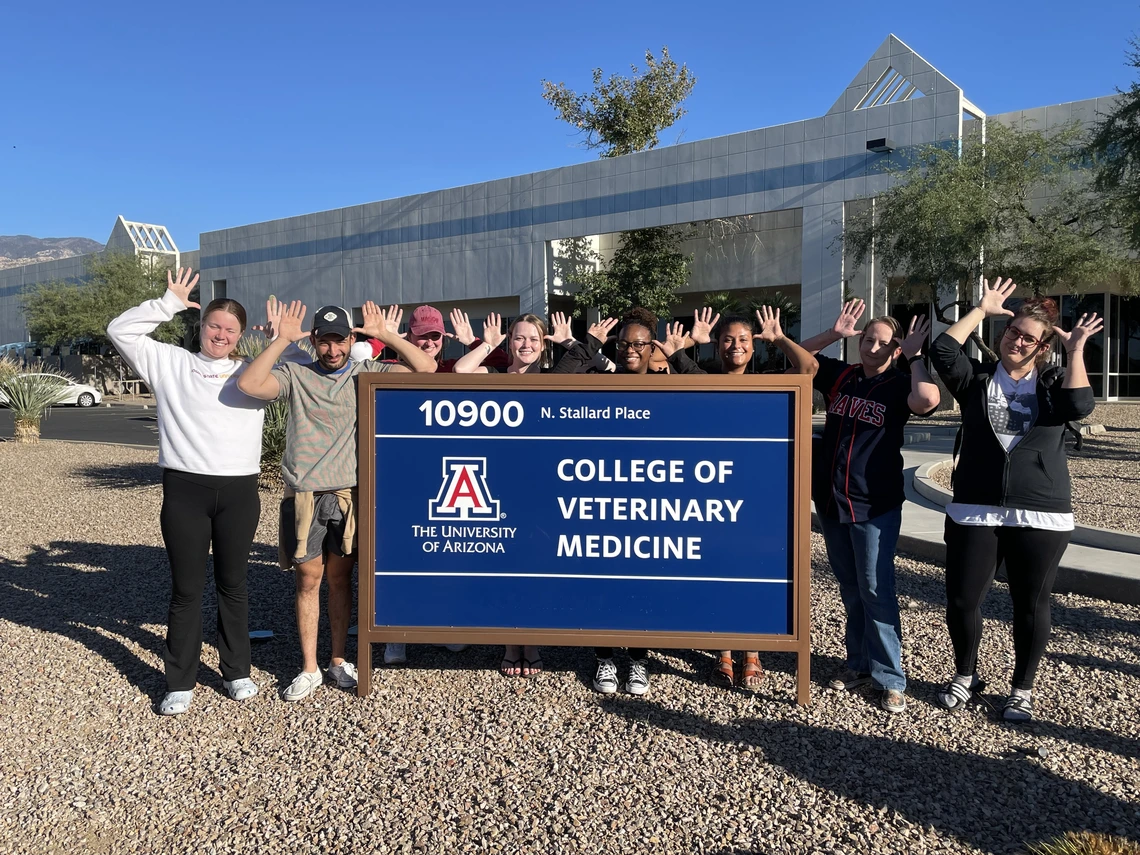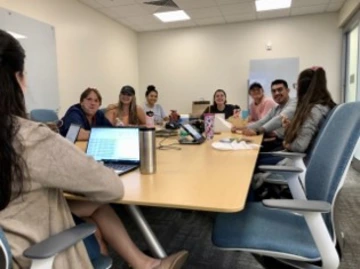Office of Wildcat Learning: Supporting VetCat Success
The University of Arizona College of Veterinary Medicine is committed to training day-one-ready veterinarians who will be active leaders in the profession and willing to tackle veterinary medicine’s toughest challenges.

Team Deer of the class of 2023 after completing a team activity.
The University of Arizona College of Veterinary Medicine is committed to training day-one-ready veterinarians who will be active leaders in the profession and willing to tackle veterinary medicine’s toughest challenges. This commitment to student success has informed our decisions as a developing college and pushed us to adopt innovative learning methods, provide essential learning support, and create multi-tiered support systems for the individuals in our program. As a result, our program is structured with training and resources available through the Office of Wildcat Learning, which houses our Learning Specialists and our Team-Based Learning Facilitators. These two dedicated teams work together to support and equip students with soft and hard professional skills that will increase long-term success outcomes and create a culture of collaboration and discovery.

While the curriculum at the College of Veterinary Medicine is grounded on evidence-based teaching methods, our team-based learning (TBL) environment is unusual for a veterinary program. Team-based learning first took root in medical programs focused on human medicine but has slowly expanded into veterinary medical education. Michael Holm, a TBL facilitator, said, “Team-based learning has been used primarily in human medicine. Knowing that students entering the field of veterinary medicine need differentiated support systems, we have dedicated ourselves to making TBL modifications that meet the needs of our students. Developing essential skills and various interpersonal attributes will afford our students the opportunity to meet their personal and professional skills.” Focused on taking students out of a lecture-style learning format, TBL encourages students to actively engage by preparing for lessons before class, and actual class time is utilized for team-based learning and hands-on training. Students, in effect, not only learn more efficiently, but also build marketable skills such as conflict management, giving and receiving feedback, and having difficult conversations with colleagues or clients while working with their assigned groups. Team-based work, however, can be challenging, so groups are supported by a team of TBL Facilitators who play a significant role in providing oversight and encouragement to students throughout their pre-clinical experience.
Team-Based Learning Facilitators are education professionals who help teams develop skills to allow them to work most effectively together. Facilitators play an integral role in developing student TBL groups—a role that is not taken lightly. TBL Facilitator, Andra Soria shared that, “understanding how students' identities play into the way they are received in the world and the way they interact with others, [and understanding] the biases they may have because of the identities they carry with them” all play a valuable role in placing students into groups that can both challenge and encourage growth. Facilitators meet regularly with groups to check in on their progression. These meetings usually serve as a place for learners to discuss and evaluate how their group is working, what is going well, what is not, how they are distributing the work, who gets to speak and how they make decisions together. The goal is for students to develop self-reflective and group skills that will enable them to work with any team or colleagues they happen to have in the future. TBL Facilitators give students the structure and framework to be successful, and students only need to embrace the opportunities placed before them.
While Team-Based Learning Facilitators complete part of the picture of how we engage on the frontlines of curriculum implementation, their counterparts, Learning Specialists, are focused on one-on-one academic support. Like TBL Facilitators, Learning Specialists have extensive educational backgrounds and experience working directly with students to support their academic efforts. Learning Specialists, however, are primarily focused on analyzing and understanding a student’s metacognition (how a student digests information) to help maximize their learning potential and increase successful outcomes. As detailed by Learning Specialist, Colin Eischeid, “We [ask] students a lot of questions about how they do things, why they do things, what they’ve done in the past, how they apply it to what they’re doing now.” According to Eischeid, Learning Specialists support students through these personal evaluation steps so “they start learning those interpersonal skills of asking themselves these reflective questions. Is this the right approach? Am I using the right strategy? Can I be doing something differently?”
Because veterinary school is extremely challenging and exhaustive, Learning Specialists work to develop a rapport with their students and strive to understand what motivates them. “Our role is to get to know them and to know what [their] motivation is so that we can help them connect to the curriculum, connect that passion to the curriculum,” said Amy Rowe. Sujin Son also acknowledged that “[our] students are very smart. They are very good. That's why they got here. But [also], what are their stories? What is their background [before] becoming a vet? Or what are the challenges they have experienced? So, listening to their stories and their backgrounds... that's an important resource.” Students quickly learn that Learning Specialists are advocates for their success and strive to create a welcoming environment for every type of individual. Amy shared,
“We want to create an atmosphere where students say, ‘I go to see a Learning Specialist because I want to learn strategies so I can perform at my peak ability.’”

Services offered by Learning Specialists include teaching effective learning strategies, assisting students in maximizing study-time efficiency, peer tutoring, and prepping students for test-taking, particularly the NAVLE® (North American Veterinary Licensing Examination) which will determine their ability to practice as a licensed veterinarian. The College of Veterinary Medicine has purchased a test preparation software program to help students practice for the NAVLE. In addition to this program, Learning Specialists regularly host workshops and collaborate with students to develop study plans. As Sujin shares, “This is the biggest exam that they have to pass to practice [veterinary medicine]. We provide individualized study plans because everyone has a different approach. So, we provide different monthly, weekly, or different types of study plans that work for them.”
Our curriculum and approach to teaching and learning are designed to engage students in their education and maximize the learning experience for all students. The Office of Wildcat Learning is an embodiment of our mission to continuously improve how we educate and innovate so we can lead the way in developing adaptive problem-solvers capable of tackling our most significant challenges. Team-Based Learning Facilitators and Learning Specialists, together, make up one small part of an incredible staff and faculty who make it their mission to support and equip students with skills that will allow them to be successful practitioners and leaders for the future of veterinary medicine.
